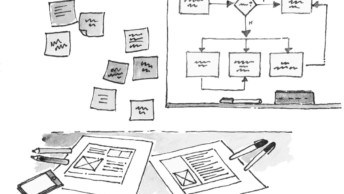User Experience (UX) is an umbrella term. But how should you position yourself within that umbrella? Do you consider yourself to be a generalist or a specialist? Where are you headed? In this post, I hope to help you answer that question for yourself.
Let me begin with my own story: several years ago I had somewhat of a career crisis.
I hadn’t yet taken the leap to freelance at this stage; I was working in a salaried role at an organisation that was fun and provided opportunities for growth. I’d moved around between a couple of different roles, but was bemoaning the fact that I had become a jack of all trades and a master of none. Basically, I had become a very good generalist, and was uneasy about the fact.
- I could write code, but only if it solved a relatively simple problem. Once the problem became complicated or the code became more complex, I struggled to get my head around it. I’m a visual thinker, and code isn’t visual.
- I could design a user interface that looked good, but not amazing. I would scour sites like dribbble for inspiration, and come away feeling inadequate, having compared my work to the incredibly talented designers on display.
This is an internal conversation I’m sure many of you have had with yourself at some point in your career.
As is often the case, the answer to the question, “Should I generalise or specialise?” is: it depends. Jared Spool penned a great article from the perspective of someone hiring a UX Designer. In it he articulated the difference between a specialist (someone who brings a good deal of skills and experience in one or more specialties) and a compartmentalist (a person well versed in their specialty, but who doesn’t know anything beyond that area). Compartmentalists are likely to wash their hands of responsibility or deliver results that fall short when the work goes beyond their area of expertise. Don’t be that person!
Letting It Go
Many of us aim for deep knowledge and experience across the board. But is it possible to acquire deep knowledge in all areas under the UX umbrella? There are certainly some individuals who are capable of achieving an extraordinary degree of mastery in muliple areas. However, in my experience they truly are rare. The likes of Bret Victor, Cameron Adams and Shaun Inman don’t come along every day.
Other discussions on this topic advocate a middle ground—the T-shaped skill profile describes a practitioner who has shallow skills in all areas across the UX spectrum, but deep skills in one particular area. While this sounds like an ideal compromise, personally I’ve accepted—nay, embraced—the idea of being a true generalist, and compensate that by learning quickly as required. In fact, the one thing I love most about the UX field is the variety of opportunity, and that to succeed one needs to possess skills that drawn from a range of disciplines and adapt on each project.
So while you won’t find me creating a UI with the exquisite detail contained in some of the galleries of dribbble’s maestros or coding a complex interaction in JavaScript, I know that, should a project call for it, my learning curve to doing so is far less steep because I’ve got a headstart in all of them. A master generalist—that’s how I market myself, and that’s the kind of role I’m constantly striving to maintain.
However, there’s one absolutely crucial factor that played a huge role in my choosing to be a generalist.
Whether You Believe You Can Or Believe You Can’t, You’re Probably Right
At the end of the day, there are multiple career paths within the UX field. One thing I’ve learned, however, is that mindset is crucial when dealing with the self-doubt that can come from having shallow skills in an area that a client expects you to be an expert. I strongly believe this: learn enough to give yourself a solid background, back your ability to learn quickly, and you’ll stand a much greater chance of achieving success. You may have a realistic view of your own abilities, but there’s no need for your future client or employer to know the full story. Note I’m not advocating you be deceptive; just that, if you’re a quick learner, you should trust in your ability to get up to speed rapidly when the situation demands it.
If you doubt whether you’re up to the task, you’ll probably discover that you do indeed fall short. However, I’d encourage you to embrace those moments when you’re outside of your comfort zone. I always counter self-doubt with a question I read in Tim Ferris’s The 4-Hour Work Week—I ask myself the following:
Has someone less intelligent than you achieved what are trying to achieve?
Of course the answer is always, “Yes.” I find this answer to be incredibly motivating, and I hope you do too.
I’d be interested in hearing your thoughts. Leave a comment below to tell me how you answer this question for yourself.
Related reading
- IxDA Discussion: Who Am I?
- UX Generalists & Specialists (Jason Robb)
- Should you hire A UX specialist or a UX generalist (Johnny Holland)
- How To: Adding Depth to UX with Generalists and Hybrids (CMS Wire)
- What Is User Experience (Crazy Egg)
This article has been translated into Russian by Dmitry Kabanov.






Nice write up.
Here are a few of my thoughts. I lean heavily towards flexibility, but specializing in a few key areas to help strengthen your skill set.
1. The need for UX professionals to have a more diverse set of skills is highly desired in the hiring world. This is especially true when you move beyond 10 years of experience.
2. The desire to at least take a peek outside your comfort zone. Yeah, you may not want to get your hands dirty in the code, but its much easier to backup why you would build something a certain way if you understand the technical implications.
3. The ability to code the interactions that may be represented by the UX – I find as the days go by a lot less Ux’ers know how to code HTML and CSS with expert level proficiency. I think this has paved the way for the emergent CX lead rolls which are heavy marketing / customer focused.
4. The ability to be flexible in the methodology used. A lot of this relates to picking the right tool for the right job. Do I use experience maps? Do I do in person usability studies? A lot of times it’s not just about building the right design solution – it’s about choosing the right methods first and foremost.
5. I taught a workshop on my process of practical UX. I think you need to do just enough work in each phase to get closer to the end result. Over-design is one of the biggest problems to combat. Pages and tombs of wireframes for 8 versions can be the death of your productivity.
To sum it all up. If you want to stand out from the crowd then you need something that makes you special.
Some wise words there Preston. Thanks for adding so much detail to the conversation!
I disagree with a UX professional needing to know how to code HTML and CSS with expert level proficiency. Even the best developers who write CSS daily would not call themselves experts. There are tools such as Axure which do more than enough and now with Adobe and Sketch pushing HTML and CSS plugins there really isn’t that need to that level.
Haha, you replied to a comment that was more than 8 years ago—things have changed a lot since then, back in 2012 there were no “no-code” applications that made our lives easier. Nevertheless, it does not hurt to know a bit about HTML & CSS to make the handover to developers as easy as possible. Also, it helps to know what’s reasonable and feasible when designing the UX/UI.
Thanks Matt – have been mulling this one over for a few months.
I’ve done a lot of work outside of UX, and still feel like a bit of a wide-eyed kid in this field. But that also makes me a specialist – someone who can contribute to both fields: bringing a depth of expertise in my area (content) to UX, and applying UX principles to projects where the client hasn’t articulated UX goals (your basic copywriting gig).
Definitely agree on knowing bits about everything. There’s a proficiency gain here, but also empathy – interactions with designers, programmers etc go a lot more smoothly if you can show that you understand their world. Cheers, Matt
Matt I think you’ve hit the nail on the head there: empathy is the thread that binds us. Actually, that’s the topic of my next post! :)
Nice summary of ‘the 2 paths in the woods…..’
The thought I have that I also advocate when I teach is that to design well, you must be able to feel the pulse of the user and for that it is invaluable to be a generalist…..and I agree with ‘has someone less intelligent than you achieved what you are trying to achieve?’ to navigate other waters….
Thanks
Thanks Jhumkee. I like the way you put that.
Cheers
Really smart people are both versitile enough to embrace a number of siciplines and to become expert in them too. Too many of us are specialized so that after a few years we cannot manage to change to a different subject whilst those whose understanding is more generalm can select the subject for immediate concentration and temporary specialization.
Would you rather learn more and more about less and less untill you know all about nothing?
UXers are always going to be generalists with strong skills in various fields. I think of myself as a good IA, since I come from the SEO field (these 2 are very related). However, over time I just realized that we as UXers are simply “holders of the entire vision”. When the marketing guy goes overboard, you jump in. When the coders have their crazy ideas, you jump in. When the stakeholders don’t know what to do, you jump in.
I haven’t seen a career which is so involving as the UX. You simply have to be involved into everything, and that’s why I agree, soft skills are extremely important for us.
The way you articulated the “internal conversation” that many of us may be having or have had so accurately captured how I’m currently feeling in my career! It is great to read that others have had the same struggles.
Thanks for the post! (I’m also going to buy The 40 Hour Work Week right now.)
Glad to hear Marie. Be sure to sign up for our community forums too! There are some amazingly helpful folks in there.
would really love to join the forum aand learn more about UX generalist and UX Specialist
Hi Rody! You can, and are very welcome to! You just need to head over to http://community.uxmastery.com/ and create a free forum account. See you in there. =)
Great article! Thanks!
Hi Matthew,
Great article you have here. I will lean towards UX Generalist, it’s more like a Design Thinker who has a lot to offer.
Thanks again for the article.
Thank you! Incredibly helpful and encouraging!